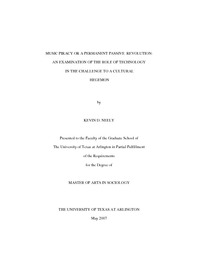
ATTENTION: The works hosted here are being migrated to a new repository that will consolidate resources, improve discoverability, and better show UTA's research impact on the global community. We will update authors as the migration progresses. Please see MavMatrix for more information.
Show simple item record
| dc.contributor.author | Neely, Kevin D | en_US |
| dc.date.accessioned | 2007-09-17T17:07:25Z | |
| dc.date.available | 2007-09-17T17:07:25Z | |
| dc.date.issued | 2007-09-17T17:07:25Z | |
| dc.date.submitted | May 2007 | en_US |
| dc.identifier.other | DISS-1707 | en_US |
| dc.identifier.uri | http://hdl.handle.net/10106/553 | |
| dc.description.abstract | The goal of this thesis is to examine a classic interpretation of Antonio Gramsci's notion of hegemony in the modern era and the emergence of counter-hegemonic forces through technology. The individualization of modern computers and related products, combined with the extreme popularity of file-swapping and social-networking websites (i.e. Napster, KaZaA, MySpace and the brand new YouTube) has completely altered the way the music industry conducts its business and has erased its hegemony over the creation, distribution and profit made from the sale of music. What makes this relationship between an industry and technology specifically different and worthy of our interest is that the anonymous nature of the Internet has not allowed a new consensus to be reached following Gramsci's concept of the passive revolution. Competing historical blocs are being created and abandoned with incredible speed, fostering a continuing emergence of counter-hegemony and a permanent state of passive revolution. | en_US |
| dc.description.sponsorship | Agger, Ben | en_US |
| dc.language.iso | EN | en_US |
| dc.publisher | Sociology | en_US |
| dc.title | Music Piracy Or A Permanent Passive Revolution | en_US |
| dc.type | M.A. | en_US |
| dc.contributor.committeeChair | Agger, Ben | en_US |
| dc.degree.department | Sociology | en_US |
| dc.degree.discipline | Sociology | en_US |
| dc.degree.grantor | University of Texas at Arlington | en_US |
| dc.degree.level | masters | en_US |
| dc.degree.name | M.A. | en_US |
| dc.identifier.externalLink | https://www.uta.edu/ra/real/editprofile.php?onlyview=1&pid=1410 | |
| dc.identifier.externalLinkDescription | Link to Research Profiles | |
Files in this item
- Name:
- umi-uta-1707.pdf
- Size:
- 583.9Kb
- Format:
- PDF
This item appears in the following Collection(s)
Show simple item record


